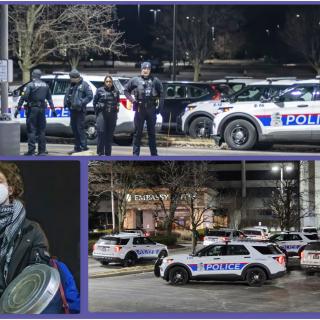Advertisement
<i>Gena Smith is a combat veteran of Iraq, and suffers from both PTSD and MST (Military Sexual Trauma). She’s a veteran advocate who volunteers for VETWOW, Veteran Women Organizing Women, which has over 3,000 members and nearly all are victims of MST. As the war on terror pushes through a second decade, it’s becoming tragically clear that for many veterans, the only way to deal with MST or combat PTSD is suicide.</i>
As news spread recently that Air Force veteran Jamie Brunette had committed suicide, her family began grasping for answers, as many families do when a love one takes their own life. The family suspected she had been victim to MST while serving in Afghanistan, but there was no proof and Jamie had never talked about it.
Twenty-two suicides a day. Almost one every hour of every day. Veterans dying by their own hand because no one is helping, and no one cares enough to put an end to this nightmare.
I am a combat veteran, and I want to explain some things to those who don’t understand the scope of the problem.
Jamie Brunette was strikingly attractive and destined to achieve her dreams. Friends and family said the 30-year-old from Florida was full of life and had a loving spirit. Success was easy for Jaime, yet she was humble, said the family. Then she was ordered to Afghanistan – twice.
While Jamie may not be a victim of MST, her family said she was receiving therapy for Post Traumatic Stress Disorder or combat PTSD, which once again has risen from hell following an American war, and apparently this harsh reality for so many hasn’t sunk in with Congress or the White House as we dangerously dance with Iran.
When we come back from war we aren’t the same people that our families loved so much. We’re not the same; no matter how attractive we are or how much money we have, or how popular we are or how determined for success.
We come back and we are afraid because we were transformed into monsters so to kill our enemies. We come back and are deeply ashamed to have survived when our friends did not.
We changed at some point during the war. A seismic shift mentally, but something we hardly noticed. Until we come home, and everything is different. The world has moved on without us, and we have to catch up.
Back in the combat zone we left behind a life that remembers when the world was safe and good. When no one wanted to kill us and we weren’t required to kill anyone, or bear witness to our friends being blown to pieces or shot.
The VA, whose task it is to save us from this epidemic of suicide and fear and self loathing, is a bureaucracy. The second largest bureaucracy in the nation behind the IRS. There are endless forms to be filled out for any simple thing. And after we’ve waded through a mountain of paperwork and waited sometimes years for the VA to determine whether they will even treat us, it’s sometimes too late. Bureaucracy is an uncaring, unfeeling monster.
In the meantime we are ravaged by confusing and terrifying symptoms. Panic attacks strike for no reason. Anger explodes from us without pity or conscious intent. We struggle with regular nightmares and insomnia. There's an inability to feel we are even real people and an inability to feel that the world around us is real. Memories we can’t escape intrude on our every waking moment. Perhaps the worst symptom of PTSD is the soul crushing depression and the desire to do anything to make the pain stop.
If a veteran survives the long wait it takes to be diagnosed by the VA, we then face the daunting task of dealing with the VA healthcare system. Psychiatrists will prescribe medicines, of which many make us feel worse, and keep prescribing medicines until they find the nearly mythical correct combination of medications and correct dosages.
Sometimes therapists make us relive the hell that we survived. The therapy is exhausting and even if successful may only somewhat alleviate our symptoms for a short period of time.
In the meantime, our families are trying to adjust to this crazy person wearing the skin of a person they used to know. They try to give us hope, but they don’t know that hope is something we left behind. They try to help us cope; while they try to cope with the damage we have wrought on their lives.
Far too many of us turn to drugs or alcohol to give us even a moment’s respite from the ugliness inside our minds. But of course drugs and alcohol often contribute to the rate of suicide. We begin to distance ourselves from those we love because we want to save them from the monster we have become.
Post Traumatic Stress Disorder isn’t an accurate description of what myself and thousands of other veterans suffer from. It implies that the trauma is over. But the trauma is refreshed and renewed every day, and we run out of energy to fight it. We are tired. Weary all the way to our souls.
We offered you our lives when we raised our right hands, and we did our part. So when we find no mercy or compassion in this world we have returned to, many of us choose to end our lives because we have no hope our sacrifice will ever end.
Every day we live with PTSD is an extension of the oath we swore to protect the American people with everything we have, including our lives. When the pain becomes so unbearable that we choose to die, it is because the government of the people, by the people and for the people, has failed to keep its promises. We failed Jamie Brunette.
And no one is held accountable. It is always someone else’s problem to fix. So it doesn’t get fixed. I beg you, please. It may not be your job to fix it, but for the sake of everything you hold dear, try to help us in some way. Just remaining aware of how bad this situation is, and how worse it could get as the drums of war rumble once more, is a good place to start.



